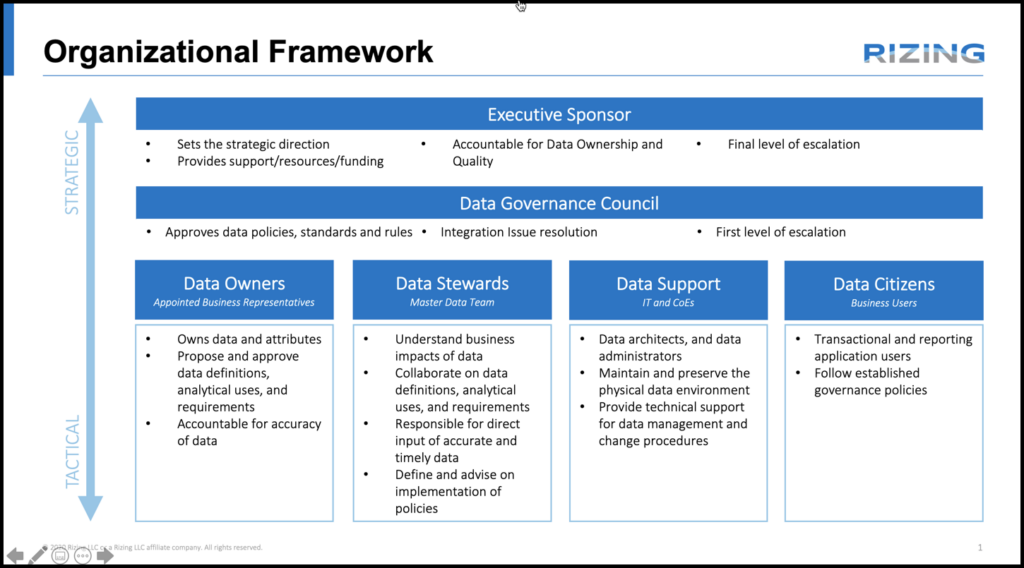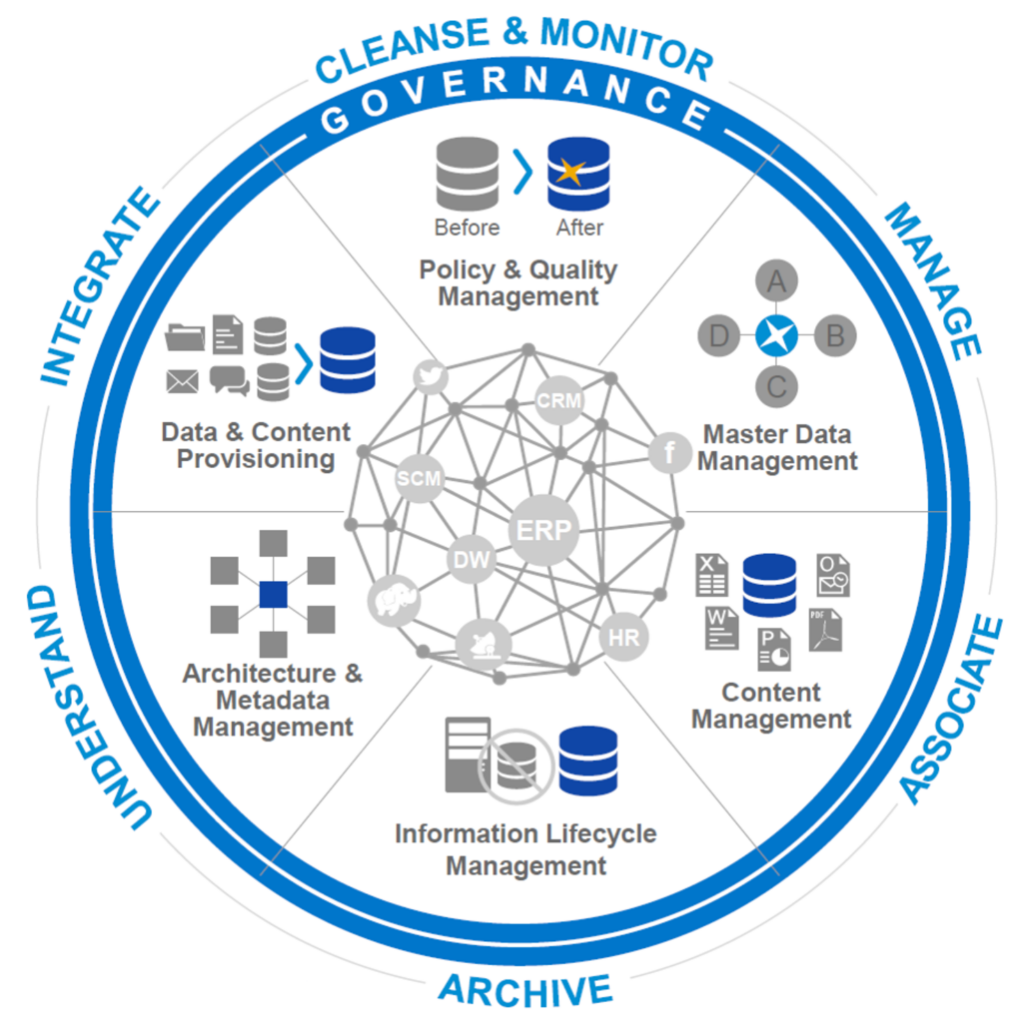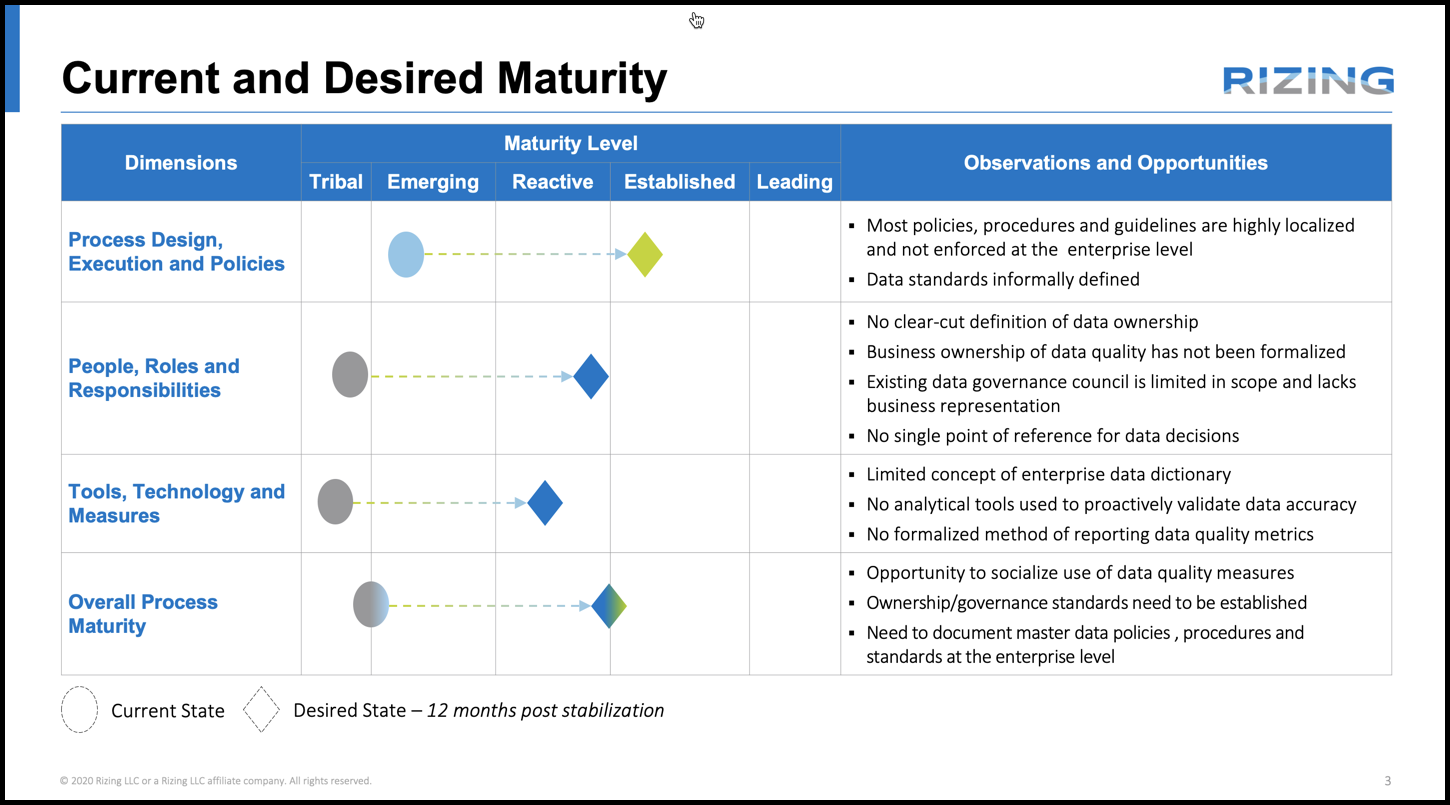Learn the essential steps in building a data-driven program focused on achieving better business outcomes. Rizing’s approach to data management and governance is grounded in the belief that data starts and ends with people and is supported by technology.
If SAP® S/4HANA® is your company’s digital transformation engine, your data is its fuel.
Curating master data before, not during, your S/4HANA implementation project is crucial for success. Beginning your project with high-quality data and a data strategy will build a foundation to ensure your data program’s longevity.
What is Data Governance?
Data governance ensures high data quality exists and moves seamlessly through all systems. We see many companies focus on system integration, but not on the people and process side of the equation. Clearly-defined data ownership, accountability, responsibilities, and escalation routes must exist throughout your company.
Governance stretches into business processes to ensure data is captured correctly, consistently, and efficiently. The best way to begin is to establish a data governance council.
When Does Data Governance Become Important?
If you start to hear the word “migration” in conversations, that’s the time to begin your data governance planning.
Data models between legacy and new systems rarely match. In between exporting data from one system and importing it to the other, system analysts often need to massage the data. Questions about archiving or updating will naturally come up. Companies will start investigating tools like SAP Datasphere to address the challenges and complexities associated with data migration and modernization.
In addition to securing better data management tools, this is where a Data Governance Council will prove handy.
Create a Data-Governance Council
A data governance council is a varied group of employees who establish clear data definitions and comprehensive policies for their organization. The council creates governing processes, establishes controls, and implements technology related to the system of record.
A governance council considers the role of employees and technology as it develops a framework for collaboration and project management between business units to ensure long-term success.
Keep it sustainable
A properly established governance committee allows organizations to create a sustainable technology and data ecosystem. By taking the time to build a sustainable data program and governing body, you’ll avoid of the pitfall of those who jump into data governance without a plan. Most often those programs fizzle out even if they aren’t overtly canceled.
A data governance council org chart
Below is an organizational framework for an emerging data organization. Each role is an integral part in a data program’s success and should be in place before starting an SAP S/4HANA implementation. This framework will help early decision-makers with the go-forward data model.

Role Definitions:
- An Executive Sponsor provides insight about an organization’s strategic direction and assists with buy-in for the council’s decisions.
- Council Chair and Members have a diverse set of skills, knowledge, and experiences to ensure that policies, rules, and standards are being followed (similar to a corporate board of directors.)
- Data Owners or Subject Matter Experts have a comprehensive perspective on the data and are the most impacted by governance decisions. Having a cross-section of experts and stakeholders ensures informed decisions get buy-in and prioritization.
- Data Stewards oversee data creation and maintenance required to conduct business while ensuring data meets existing rules and standards.
- IT and other support teams ensure that council decisions complement and integrate with strategic technology priorities. They also ensure business process decisions don’t cause conflicts – especially on larger initiatives.
- Data Citizens are business users who create and consume data as part of their everyday work. Evolving into a data-driven culture is depends on this group of individuals. They must recognize the value of establishing data policies and procedures, and the critical role a data governance council plays.
Develop a Holistic Data Strategy
 Cloud, big data, and social media allow companies to respond to customer preferences, identify operational efficiencies and create new business models.
Cloud, big data, and social media allow companies to respond to customer preferences, identify operational efficiencies and create new business models.
To achieve transformative business results, businesses must treat information as a corporate asset. Data is carefully managed, governed, used, and controlled.
Lifecycle of data
With a data governance council in place, it’s important to build an outcome-based data strategy for your company. We suggest strategy that covers the complete data lifecycle shown (illustration courtesy of SAP).
To optimize the use and cost of managing data, it’s important to understand that lifecycle. There are three things that happen with data. We:
- Create it
- Use it
- Stop using it
By grouping data this way, we can discuss the costs and activities in each stage. A large data project, such as the move to SAP S/4HANA, requires us to carefully construct our data model and the data we move into it.
Prepping now makes life easier later
Corporate data always has multiple uses. Preparing data for all of its uses up-front makes subsequent repurposing easier.
Off-board data to save money
When information is no longer required it should be archived according to your organization’s pre-determined legal and business requirements. Most companies don’t follow this approach and spend millions of dollars each year maintaining outdated data and systems.
Elements of a comprehensive data strategy
A comprehensive data strategy has technical components that support end-to-end data architecture and a roadmap for delivery, including:
- Data modeling – use business process maps and models to understand data movements.
- Flexibility of platforms – build a flexible platform able to respond quickly to evolving business requirements.
- Data orchestration – maintain data in a single location with capabilities to enrich and govern data distribution to other internal systems.
- Data quality – achieve high-quality data with well-defined metadata, policies, rules, and standards.
- Master data governance – evolve governance methods from passive to active by defining processes central to your critical data.
- Retention and archiving – automate end-of-life data processes to increase compliance while decreasing costs and risks associated with policies such as GDPR (Global Data Protection Requirements) and CCPA (California Consumer Privacy Act).
- Analytics – rely on data warehousing able to support business intelligence, financial planning, and predictive analytics.
Assess Your Data Readiness
The best way to start your data project is to understand the current and desired state of your data. We do that with a capabilities assessment with results mapped to your defined capabilities maturity model.
The assessment will capture the dimensions, capabilities, observations, and opportunities. Once the exercise is complete, you’ll have a summary document like this:

Using a simple maturity model scale, from 1 (capability does not exist) to 5 (capability is leading or best practice), you’ll understand the health and quality of your data. This exercise will help you determine what data-related activities to tackle and when to do them.
Benefits of Data Readiness
Understanding your data better is always beneficial, however, completing this work up-front has added benefits for your SAP S/4HANA implementation project, including:
- More focused project scoping
- Quicker drafting of functional and technical specifications
- Decreased blueprinting and development costs
- Shorter testing cycles
- Increased business adoption
Data Readiness Ensures Project Success
Data readiness involves more than your data and technical platforms. It also includes organizational design and business strategy to prepare your company to move forward with its SAP S/4HANA implementation.
Taking the time to complete these steps before starting your project can have a lasting and positive impact on your company.
Need Help?
If you need help creating a data governance council, please contact us.


